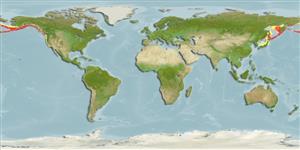Teleostei (teleosts) >
Perciformes/Cottoidei (Sculpins) >
Hexagrammidae (Greenlings) > Pleurogramminae
Etymology: Pleurogrammus: Greek, pleura = side, ribe + Greek, gramma = letter, signal (Ref. 45335).
More on author: Pallas.
Environment: milieu / climate zone / depth range / distribution range
Ecology
Marine; demersal; depth range 0 - 720 m (Ref. 114138). Boreal; 64°N - 34°N, 130°E - 118°W
North Pacific: between the middle Kuril Islands and Gulf of Alaska; including off the coast of Eastern Sakhalin, in the north of the Sea of Okhotsk, waters of Hokkaido, southern Kuril Is., and to the north up to Anadyr Bay. In the Sea of Japan, found once in northern Primorye and caught south of Moneron I. and in the open part of Peter the Great Bay (Ref. 114081). Southward range up to Redondo Beach, California (Ref.
Length at first maturity / Size / Weight / Age
Maturity: Lm 32.5 range ? - ? cm
Max length : 56.5 cm TL male/unsexed; (Ref. 56527); 35.0 cm SL (female); max. published weight: 2.0 kg (Ref. 56344); max. reported age: 15 years (Ref. 55701)
This species is found at the demersal zone and near surface over reefs and hard bottoms from intertidal zone to about 2.360 ft (719.8 m). It is preyed upon by other fishes, sea birds and marine mammals (Ref 114183).
Spawns twice a year (Ref. 28499). Eggs are deposited in rock crevices and are guarded by the male who continuously fans the egg mass with his pectoral fin until hatching (Ref. 28499), which occurs after 40-45 days (Ref. 27369).
Eschmeyer, W.N., E.S. Herald and H. Hammann, 1983. A field guide to Pacific coast fishes of North America. Boston (MA, USA): Houghton Mifflin Company. xii+336 p. (Ref. 2850)
IUCN Red List Status (Ref. 130435: Version 2024-2)
Threat to humans
Harmless
Human uses
Fisheries: commercial; gamefish: yes
Tools
Special reports
Download XML
Internet sources
Estimates based on models
Preferred temperature (Ref.
123201): 0.7 - 6.1, mean 3.7 °C (based on 359 cells).
Phylogenetic diversity index (Ref.
82804): PD
50 = 0.7502 [Uniqueness, from 0.5 = low to 2.0 = high].
Bayesian length-weight: a=0.00955 (0.00487 - 0.01871), b=3.06 (2.88 - 3.24), in cm total length, based on LWR estimates for this species & (Sub)family-body (Ref.
93245).
Trophic level (Ref.
69278): 3.4 ±0.0 se; based on diet studies.
Resilience (Ref.
120179): Low, minimum population doubling time 4.5 - 14 years (K=0.28; tm=3.6; tmax=15).
Prior r = 0.20, 95% CL = 0.13 - 0.30, Based on 5 full stock assessments.
Fishing Vulnerability (Ref.
59153): Low to moderate vulnerability (30 of 100).
Climate Vulnerability (Ref.
125649): Moderate to high vulnerability (52 of 100).
Nutrients (Ref.
124155): Calcium = 14.2 [8.0, 61.2] mg/100g; Iron = 0.575 [0.216, 1.388] mg/100g; Protein = 18.5 [15.8, 20.7] %; Omega3 = 0.563 [0.245, 1.648] g/100g; Selenium = 22.1 [10.0, 53.8] μg/100g; VitaminA = 7.08 [1.69, 29.21] μg/100g; Zinc = 0.477 [0.224, 0.884] mg/100g (wet weight); based on
nutrient studies.
